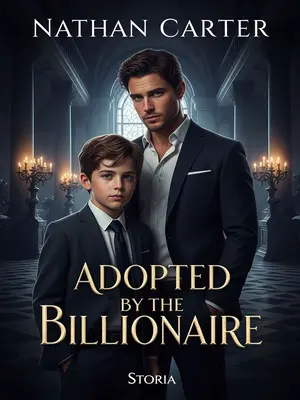Chapter 5: First Meetings and Final Goodbyes
My first encounter with Derek Callahan was three years ago.
It was late September—the air thick with the smell of wet leaves and fresh paint. The university quad was slick with rain, banners flapping for the new science building. I wore my stiffest dress and a name badge that kept flipping over.
He had donated two new buildings to our university. On the day of the ribbon-cutting ceremony, I was working part-time as an event hostess. Distracted, I accidentally spilled champagne on him.
The glass slipped from my hand, cold bubbles splashing across his chest. I froze, mortified, as a hush fell over the crowd. Derek looked down at the spreading stain, then back up at me—his stare made me want to disappear.
The university administrators were upset and told me to apologize to Derek.
They pulled me aside, whispering about funding, reputations, and how much trouble a simple mistake could cause. My cheeks burned as I rehearsed my apology.
After I got off stage, a senior told me just how powerful a man I’d offended: the richest man in Chicago. If Derek Callahan so much as snapped his fingers, the world would tilt.
She listed off companies, foundations, the kinds of numbers that made my head spin. Suddenly, my mistake felt even bigger, the consequences heavier.
After the event, I chased after his car at the campus gate. He sat inside, sunglasses hiding his eyes, his expression unreadable.
I jogged across the parking lot, breathless, and tapped on the tinted window. The glass slid down slowly, revealing Derek in all his intimidating glory.
I cautiously explained, “Mr. Callahan, I’m really sorry for staining your clothes. Could you tell me the brand? I’ll buy you a new one.”
My words tumbled out in a rush. My voice trembled, but I made myself hold his gaze, even as my knees threatened to buckle.
His assistant laughed. “Miss, do you know how much Mr. Callahan’s suits cost?”
His tone was condescending, but I forced myself not to flinch.
He quoted a staggering price, then added, “And they’re all handmade in Italy. You can’t just buy them anywhere.”
I felt smaller than ever, suddenly aware of every flaw in my thrift-store dress. The world of bespoke Italian suits was as foreign to me as the moon.
I wanted nothing more than to crawl into a hole, mortified by my ignorance.
Every pair of eyes in the lot seemed to be watching. I chewed my lip, fighting the urge to bolt.
Derek took off his jacket and said indifferently, “If it’s dirty, toss it.”
He shrugged out of the stained blazer and handed it off to his assistant. The gesture was so casual, so dismissive, it made my apology feel even more pathetic.
The car window rolled up in front of me, like a door slamming shut between our worlds.
I stood there, shivering in the early evening air, realizing that I was out of my depth.
I thought that would be the end of it.
I tried to forget it, burying myself in classwork and odd jobs, hoping my embarrassment would fade with time.
But a few months later, my mother’s illness relapsed. She needed a large sum for surgery. We’d already borrowed from every relative, and the university had helped as much as it could. I was nearly in despair.
The bills piled up, the nights grew longer, and hope seemed to shrink with every phone call from the hospital. My mother’s voice grew weaker with each visit, and I knew I was running out of time.
Watching my mother suffer, I gritted my teeth and went to Callahan Group headquarters.
I stood in the marble lobby, heart in my throat, rehearsing what I’d say. The receptionist’s eyes lingered on my thrift-store shoes, but I held my ground.
For some reason, he agreed to see me. His assistant led me up; Derek sat behind a wide, expensive desk, legs crossed.
The office was all glass and steel, the kind of place where the city seemed to kneel at his feet. A framed Bulls jersey hung on the wall behind him. He didn’t look up when I entered, just kept typing, as if I was another problem to be solved.
After hearing my request, he took a drag on his cigarette and asked, meaningfully, “You want my help. So tell me, Miss, what are you willing to offer in exchange?”
His eyes flicked up, sharp and appraising. I felt exposed, like I was standing under a spotlight.
“I can write you an IOU. Set the interest yourself. After I graduate and start working, I’ll pay you back, with interest.”
I laid out my plan, desperate to sound confident. My hands shook as I clutched my bag.
He laughed, his gaze burning as it swept over me.
The sound was low and cold, more mocking than amused. I felt like a child caught in a lie.
After a long pause, he finally spoke. “Money, I have plenty. As for what I want—Miss, you’re a smart woman. Why not guess for yourself?”
He didn’t bother to hide his meaning. My stomach twisted.
Then he had me thrown out.
I barely had time to protest before his assistant ushered me into the hall, doors closing firmly behind me.
Before I left, his assistant handed me an address. “Eight o’clock tonight. Be on time. Mr. Callahan doesn’t wait.”
The card was thick, the letters embossed. I stared at it, heart pounding, knowing exactly what it meant. Still, I clung to the hope that there was another way.
At twenty-two, all I had left was my pride—and even that was wearing thin.
I walked home that night beneath a sky full of city lights, wondering if the price I was about to pay would haunt me forever.
That night, I wore a white lace nightgown and climbed into his bed. The nightgown was torn to shreds, along with my self-esteem.
The memory burned—cold sheets, his hands rough and impatient, my dignity unraveling thread by thread. I closed my eyes and counted my breaths, telling myself I was doing this for my mother.
Those days lasted for three years.
Three years of secrets, of whispered phone calls and hiding from the world. Three years of pretending I didn’t care.
We agreed: I would stay with him for five years. In those five years, I had to be on call, never allowed to refuse. When the time was up, he’d let me go.
It was a contract, as cold and binding as any legal document. The rules were clear—no strings, no expectations. Just survival.
But my mother didn’t last that long. In my second year with Derek, she still passed away. Fortunately, she never learned that her proud daughter had long since sold her body for money.
I sat by her hospital bed, holding her hand as the machines beeped quietly. She died believing I was still the good girl she’d raised. I’ve tried to make peace with that lie ever since. Some nights, I still hear her voice, gentle and proud, and it breaks me all over again.













